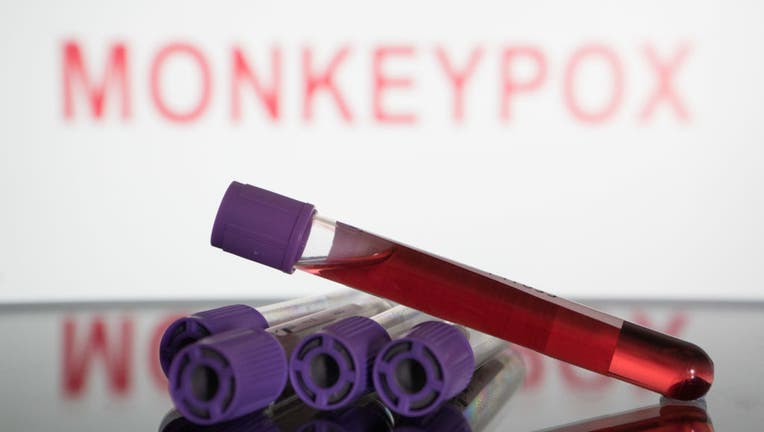CDC expanding monkeypox testing with commercial laboratories

In this photo illustration, blood test vials are seen in front of a screen that says ''Monkeypox'' (Photo illustration by Nikos Pekiaridis/NurPhoto via Getty Images)
ATLANTA - The Centers for Disease Control and Prevention announced LabCorp will begin utilizing its largest clinical laboratory to increase nationwide testing capacity on monkeypox.
The announcement came Wednesday when there were 560 confirmed cases in the United States.
LabCorp will use the CDC's test to detect orthopoxviruses not related to smallpox, including monkeypox.
"The ability of commercial labs to test for monkeypox is a key pillar in our comprehensive strategy to combat this disease," CDC Director Rochelle Walensky said in a statement. "This will not only increase testing capacity but will make it more convenient for providers and patients to access tests by using existing provider-to-lab relationships."
WHO SHOULD GET VACCINES FOR MONKEYPOX?
LabCorp estimates it can double the current testing capacity by performing 10,000 tests per week.
The United States Department of Health and Human Services said it expanded monkeypox testing to five commercial laboratory companies in June.
IS MONKEYPOX A GLOBAL EMERGENCY?
"All Americans should be concerned about monkeypox cases," HHS Secretary Xavier Becerra said. "Thankfully we have right now the tools to fight and treat cases in America. By dramatically expanding the number of testing locations throughout the country, we are making it possible for anyone who needs to be tested to do so."
When to get tested for monkeypox
The CDC says anyone with a rash that looks like monkeypox — deep-seated, painful lesions sometimes on the palms of hands or soles of feet — should talk to their healthcare provider about whether or not they need to get tested.
The CDC recommends people with monkeypox symptoms talk to a healthcare provider regardless of contact with someone confirmed to have a case of monkeypox.
Healthcare providers can order the orthopoxvirus test.
What is monkeypox?
Monkeypox is a virus that originates in wild animals like rodents and primates and occasionally jumps to people. Most human cases have been in central and west Africa, where the disease is endemic.
The illness was first identified by scientists in 1958 when there were two outbreaks of a "pox-like" disease in research monkeys — thus the name monkeypox. The first known human infection was in 1970, in a 9-year-old boy in a remote part of Congo.
What are the symptoms of monkeypox and how is it treated?
Monkeypox belongs to the same virus family as smallpox but causes milder symptoms.
Most patients only experience fever, body aches, chills and fatigue. People with more serious illnesses may develop a rash and lesions on the face and hands that can spread to other parts of the body.
The incubation period is from about five days to three weeks. Most people recover within about two to four weeks without needing to be hospitalized.
Monkeypox can be fatal for up to one in 10 people and is thought to be more severe in children.
People exposed to the virus are often given one of several smallpox vaccines, which are effective against monkeypox. Anti-viral drugs are also being developed.
The European Centre for Disease Prevention and Control recommends all suspected cases be isolated and that high-risk contacts be offered the smallpox vaccine.

